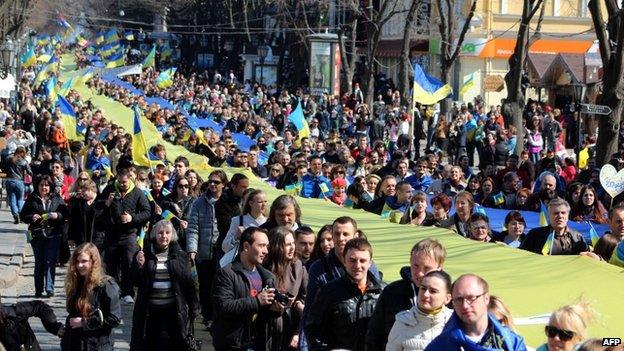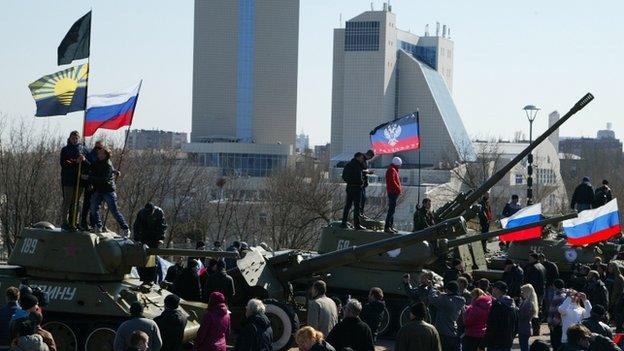Ukraine crisis: US-Russia deadlock despite 'frank' talks
- Published
US Secretary of State John Kerry: "This principle is clear - no decisions about Ukraine without Ukraine"
US Secretary of State John Kerry has announced no breakthrough on Ukraine, following four hours of "frank" talks with Russian counterpart Sergei Lavrov.
Mr Kerry said he told Mr Lavrov that the US still considered Russia's takeover of Ukraine's Crimea region to be "illegal and illegitimate".
He said he had stressed that no decision on Ukraine's future could be made without Kiev's involvement.
Earlier Mr Lavrov set out demands for a neutral and federal Ukraine.
Mr Kerry told a news conference in Paris: "We will not accept a path forward where the legitimate government of Ukraine is not at the table.
"This principle is clear: no decisions about Ukraine without Ukraine."
He said he had also raised "strong concerns" about the presence of Russian troops on the Ukraine border, which he said created a climate of fear and intimidation.
'Differences of opinion'
Mr Lavrov has categorically denied any plans for an invasion.
At a separate briefing, the Russian foreign minister said he and Mr Kerry agreed to work with the Ukrainian government to improve rights for Russian-speaking Ukrainians and disarm "irregular forces and provocateurs".
Moscow claims that "fascists" have taken power in Ukraine, jeopardising the safety of Russian speakers.
Mr Lavrov told Russian state TV before the crisis talks on Sunday that Ukraine should come up with a new constitution "providing for a federal structure" and neutrality.
The Ukrainian foreign ministry said it deeply regretted Mr Lavrov's "patronising" remarks, describing them as an attempt to break up the country.
The Kerry-Lavrov meeting was hastily arranged after President Vladimir Putin spoke to President Barack Obama by phone late on Friday.
Mr Kerry stressed the need for a "diplomatic solution" to the crisis at his latest news conference.
"The US and Russia have differences of opinion on the events that led to this crisis - but both of us recognise the importance of finding a diplomatic solution," he said.

Pro-European activists held a rally in the southern Ukrainian city of Odessa on Sunday

Meanwhile pro-Russian demonstrators gathered at a World War Two museum in Donetsk
He said the two countries would work with Ukrainian government to achieve priorities such as language rights, disarmament of "irregular forces and provocateurs", and constitutional reform.
The BBC's diplomatic correspondent Bridget Kendall says until now it has appeared as though the Russians and Americans have been talking past each other on Ukraine.
But while the Paris talks delivered no breakthrough, it did feel for the first time as though the two sides had found a point of contact - even if it was largely in response to Russia's demands, she adds.
Russian Foreign Minister Sergei Lavrov: "We have absolutely no intention of, or interest in, crossing Ukraine's borders"
Protests
Meanwhile, as the rest of Europe put clocks forward by one hour on Sunday, Crimea aligned its time with Moscow, jumping two hours ahead. Hundreds of people waving flags greeted the time change in the capital, Simferopol.
Voters in the mainly pro-Russian peninsula backed leaving Ukraine for Russia in a referendum a fortnight ago. But the vote has been condemned as illegal by Kiev and the UN General Assembly.
Russia has taken over most of Ukraine's military bases in Crimea.
The Pentagon believes Moscow has massed tens of thousands of troops close to Ukraine's eastern border, prompting fears of an invasion.
It comes after pro-EU protests in Kiev led to the ousting of Ukraine's President Viktor Yanukovych. He had faced months of demonstrations after pulling out of an association deal with Brussels.
